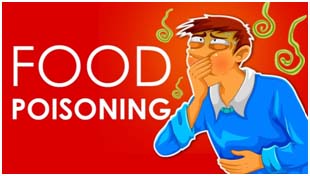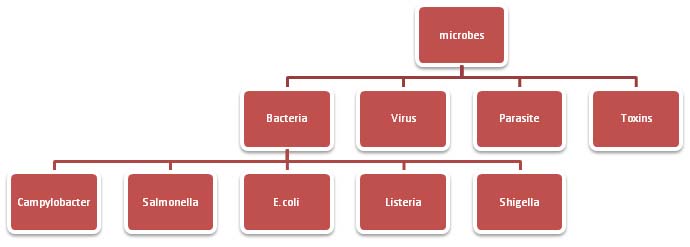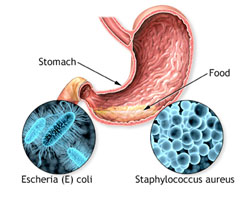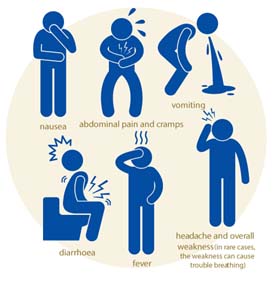Food-borne illness is commonly referred to as food poisoning. It results from consuming contaminated, toxic or spoilt food. It is a common yet distressing disease. It leads to a lot of discomfort.
Causes of contamination – consumption of contaminated food is the leading cause.
Food contamination may result from:
- Not cooking food properly (especially meat)
- Improper condition of storage
- food prepared without washing hands properly
- Any food prepared using cooking utensils, cutting boards, and other tools that are not fully cleaned
- Not washing fruits and vegetables properly
- Campylobacter -The bacteria are usually found on raw or undercooked meat (particularly poultry), unpasteurized milk and untreated water. This bacterium causes acute diarrhea
- Salmonella -Salmonella bacteria are often found in raw or undercooked meat, raw eggs, milk, and other dairy products. It may cause a condition known as reactive arthritis in a small percentage of people
- Escherichia col -E. coli, are bacteria found in the digestive systems of many animals, including humans. Most strains are harmless but some can cause serious illness. E.coli poisoning occurs after eating undercooked beef or drinking unpasteurized milk
- Listeria -Listeria bacteria may be found in a range of chilled, "ready-to-eat" foods, including pre-packed sandwiches, cooked sliced meats and soft cheeses
- Shigella–any food washed with contaminated water contains shigella bacterium. Shigella is a bacteria generally transmitted through feces
- Virus – norovirus or the Norwalk virus is the most common virus that causes vomiting and diarrhea. It easily spread from person to person, through contaminated food or water. Raw shellfish, particularly oysters, can also be a source of infection. It causes over 19 million cases of food poisoning each year and in rare cases it can be fatal. Hepatitis A virus also comes through contaminated food
- Parasites -Food poisoning caused by parasites is not as common as food poisoning caused by bacteria, but parasites spread through food are still very dangerous. Parasite can live inside a body undetected for many years. It is usually caused Platyhelminthes, Nematodes and a few protozoans
- Toxins – a few food poisoning cases are caused due to enterotoxins released by certain organisms. One of them is botulism, caused by eating foods that contain the botulism toxin. This toxin is released due to bacterium Clostridium botulinum
Signs and Symptoms
most common symptoms include –- Abdominal cramps
- Nausea and vomiting
- Mild fever
- Loss of appetite
- Muscle aches
- Diarrhea
- Chills
- Headache
Prevention – the best way to prevent food poisoning is to
- Maintain cleanliness and hygiene
- Avoid food prepared in unhygienic condition
- Washing hands and cooking the food properly also helps to prevent the disease
"Cleanliness is next to godliness" is apt. The Food Standards Agency (FSA) recommends remembering the "four Cs":
- cleaning
- cooking
- chilling
- cross-contamination
Proper rest and rehydration is required.
- Avoid dehydration by consuming plenty of water. One can also take ORS solutions to maintain the electrolyte balance.
- Proper rest
- Eating healthy food
- Avoid fatty and spicy foods
- Avoid alcohol, caffeine, fizzy drinks as they may make you feel worse



